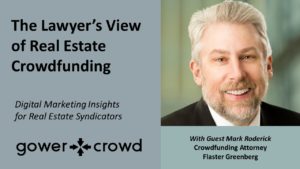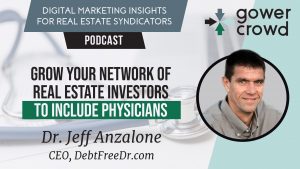Carter Malloy, AcreTrader
How Investors Can Make Money in Farmland Through Crowdfunding
 Carter Malloy, Founder and CEO of AcreTrader
Carter Malloy, Founder and CEO of AcreTrader
It is without doubt that some of the wealthiest people in America, actually in the world, are its farmers. My guest today is Carter Malloy, the founder and CEO of AcreTrader, a real estate crowdfunding platform that owns farms and sells shares in them to investors like you or me.
Ponder for a moment, even during the last downturn and resulting global financial crisis, what was the one thing that you could rely upon the most? The food supply. Despite panic buying at the beginning of the COVID crisis, there’s been absolutely no impact on the abundance of food at the grocery stores. It has been a non-event. But how the heck does that happen? Well, simply stated, it's because we have one of the most robust food chain systems in the world.
And sitting right at the very foundation of that is the farm. So serving that market, Carter Malloy's built one of the most sophisticated websites and marketing systems in the crowdfunding space.
What You're Going to Learn
- How Accredited Investors Can Now Invest in Agriculture
- Why Agriculture Is a Three Trillion Dollar Asset in the USA
- How Agriculture Investors Make Money in Two Different Ways
- How to Understand the Investment and Financial Philosophy of AcreTrader
- How to Compare the Tenant Risk on Agricultural Investments
- How AcreTrader Educates Accredited Investors about Farmland Real Estate
- How to Develop Educational Content for Investors
- And much more!
Listen To or Watch the Full Podcast Here
Show Highlights
FOR REAL ESTATE DEVELOPERS
THE WHITE BOARD WORKSHOP
Learn the exact system best of class sponsors use to raise money online.
Accredited Investors Can Now Invest in Agriculture
ADAM GOWER: Carter Malloy, CEO and founder of Acre Trader. What a pleasure it is to have you on the show. And like I told you, in our pre-podcast chit-chat, what I would like to hear from you, out of the gate is, your elevator pitch for any new prospect that you might come across who you know is an investor in real estate, an accredited investor, you know, they invest, why should they invest in agriculture?
CARTER MALLOY: Great question. One we talk about all day, everyday. That's right. Agriculture or farmland is real estate. So we are real estate investors. We do it through our website AcreTrader.com and it's a very simple investing platform, you named it, for accredited investors currently, and we allow you to invest in farmland. Why would you want to invest in farmland is the next question we get. That sounds incredibly boring and, it is. And that's great, you know, boring assets can often be very good ones. And farmland is certainly one of those where, over the last 30 years or so, it's compounded almost at 12 percent IRR for its investors. It's done that without leverage. So without debt and without the volatility you see, the big positive and negative swings you see in commercial real estate returns, for example, farmland has not experienced those. So it's a slow and steady compounder and that's what we're after. You know, is investing for portfolio diversification and risk-adjusted returns and that's why we're excited about farmland.
ADAM GOWER: Fine. So you've said a couple of things here, and just so you know. I am, just make sure, you know, I'm typing here, I'm not sending e-mails or texts or anything. I'm just taking notes, basically, of what we're talking about. So you said two things that are very, very important. Number one, without debt, that's a big WOW, because as we all know, debt is the killer. Right? It's the killer. It doesn't matter what happens, if there's a downturn and you've got debt, there's a potential you could lose your asset to somebody else higher up or lower down in the capital stack, right? Higher in the priority. But, there has to be a downside to farmland and to investing in farmland. So tell me, what are the downsides? Right? I want to know, what are the downsides?
CARTER MALLOY: Yeah, there's downsides in everything and, you know, there's no risk-free returns certainly out there. But as a whole, the downsides for us, really, there's macro and there's micro. Right? So, we think about macro risks to investing in farmland. Commodity cycles can be tough. We've been in one for five years now, low commodity prices. That doesn't help us, as farmland investors and we've seen that with farmland values. We're not talking about returns because you also get a rent from the farmer. But the values themselves have slowed down in their appreciation over the last five years as commodity prices have slowed. Interest rates are impactful as well in productivity. So does that land grow more and more food every year? Can technology continue to help expand the value of that land? And the good news is, is both interest rates and productivity have continued to be macro-drivers, while commodity prices have not. Then, there's micro-drivers and that's where the real risks lie. And that's where we really spend our our time and thinking, is diligence. Making sure you underwrite the right farms and not the wrong ones. Farmland is an incredibly idiosyncratic asset class, in that, one parcel right next to a great one, may be total garbage. And so, we've got a world-class team of farmland underwriters and a farm valuation team that goes out and looks for farmland. We talk to farmers and farm sellers every single day and a lot of those, to boot. And that's the biggest, I would say, focal point of our company is due diligence, is going out and really, really aggressively underwriting every parcel that we bring to the website. And to that, we maybe list 1 in 100 farms we look at. And that's a big maybe. It's something much less than that in reality.
Agriculture Is a Three Trillion Dollar Asset in the USA
ADAM GOWER: So tell me, first of all, what are you doing actually, on Acre Trader? Are you the principal that is buying farms and buying farmland and then leasing it or are you making loans to farmers? Like, what's the financial model? What's going on from, you know, beginning, from seed to table, however you want to characterize it?
CARTER MALLOY: That's a good question that you want to discuss first. It's very simple. We take a parcel of land. We place that land in a unique LLC that would then hold the title of the land and we allow investors to come buy 10, 20 thousand dollars, hundred thousand dollars worth of that LLC. And then we take care of distributions and everything else back to that investor so that they don't have to think about all the headaches that come along with owning farmland. And when you mentioned, I haven't thought of, contemplated investing in farmland before, most people haven't. What's fascinating is, it is a 3 trillion dollar asset, just here in the US. It's been like, 9 trillion globally, but it has not been something that's highly institutionalized for a very long time. Until the last 10 years, we've seen private equity really rushing in and private equity, in this space, in the US, has grown from 3 billion to about 30 billion of investment. So, it's still, really small in the grand scheme of things. But the asset is becoming more and more professionalized as more people wake up and look at the return figures and go, wait, hold on, raw dirt, you know, this really boring asset has compounded at what level? And with what volatility and with no correlation to most other major asset classes?
ADAM GOWER: But you know, the challenge, and by the way, you went silent for a moment through that higher, fantastic explanation, so I'm hoping that Zoom picked it up, in the background, so I can listen to it later on. A slight disadvantage that I didn't hear it. But, how do you, what is the underwriting process for determining whether or not this piece of land versus this one is one that is viable?
CARTER MALLOY: So we do both a top-down and bottom-up analysis of every piece of land we see. So that includes, what does the area look like? What are the local comps look like? We've got a extremely large and proprietary data set of comparable sales for farmland. Beyond that comparison, sort of, top-down approach of, is this a good "local" deal? Then we do bottom-up and that's really the majority of the work. So underwriting the soil, you know, for us, every farm boils down to three things: soil, water and financial profile. So the first two are very straightforward. Soil, is it a good quality soil? Can we be crop agnostic and grow other things, in the soil? The second one is water. Is there good permanent access to water? We don't want to think about water going away. And there are a lot of places where that's a problem. And you can see, what looked like a great deal on the surface. In reality, there are great deals and in 10 years when there's no water that becomes a desert and we don't want that. Then financial profile is a catchall term for the things that really impact the value of that farm. So valuation, cap rate, rents. What does the tenant look like, etc. So it's a long checklist we go through. It's a very formalized process we have,
ADAM GOWER: Yes
CARTER MALLOY: with both software and people.
Agriculture Investors Make Money in Two Different Ways
ADAM GOWER: How do you grab somebody's attention, right? And I mean this in terms of the way that we communicate now. Crowdfunding, it's really, you know, it's... real estate has been crowdfunded forever. The difference is, today, as you know, you can actually approach people who you don't know. And so presumably the way you do that is on social media, etc. I don't know what else you do, but I'm interested in knowing. But what do you, how do you grab somebody's attention for this? And forgive me for saying this, somewhat obscure option. Right? This alternative, alternative investment. What have you found works the best?
CARTER MALLOY: The truth is the big one, right? Like we are not exaggerative or hyperbolic in any of our messaging. We're fact-based. And I think, when we show people the facts, hey, here's the performance history of this asset class. Hey, here's how it works. And we're factual in our marketing. That helps a lot. You may get people's attention with a flashy, flashy message, or a promise or a guarantee but you also can get in a lot of trouble. And it's something that, you know, as a side note, you shouldn't. There's no room for that. There's no reason to act like that.
ADAM GOWER: Ok, but that's very important. What you've said is very important. You said that the first thing is you talk about facts and the first thing you talk about is performance history, right? So when you talk about performance history as being a factual part of investing in farmland, you're also talking to what I call the WIIFM response. Right? The What's In It For Me? That's what your approach. You're not talking about anything technical, really. The first point of contact. Actually its phrased me this as a question. First point of contact is to approach an investor with the "What's In It For Me" data, right? The statistics. And that's your first point is, how much you're going to make right when you invest in farmland. And that's what brings them into your orbit and then what do you do?
CARTER MALLOY: I want to pause there. We don't say, hey, here's how much you'll get. You know, the past is no guarantee of the future. People are very clear that we still yell out from the mountain top, that, you know, this is past information. The future is unknown. But what, you know, to boil down the message very simply, what we often point to is there's 2 ways to make money in farmland. A) You can make money from the farmer paying you rent because we're not farmers. We have to tell people that quite often. It's still difficult to understand. We're not out driving tractors and, you know, picking lettuce and, you know, driving and harvesting corn off the fields. The tenants do that. So we simply on the land. So you make money 2 ways. You can make money 2 ways. One is, the farmer paying you rent. And 2 is, appreciation in the asset class. And both these are very easy to understand. Farm pays you rent because they want to use the land and farmers all want to grow their business. Many of them do because of economies of scale. So the vacancy rates and default rates in farmland are shocking. Yeah, they're just incredibly low. Both of them. And then land appreciation is also very easy to wrap your head around because we only have so much. You can build new apartments everyday. We have this much farmland in the world and the amount of farmland in the United States, for example, is shrinking every day. The stats are something like three acres per minute of farmland we lose. But we have more people to feed every day. Everyone has to eat. And so stooging really tends to resonate people. Boil it down first. Explain that, Hey, this is dead simple, you know. And then 2) show them information and show them how it works.
Understanding the Investment and Financial Philosophy of AcreTrader
ADAM GOWER: What's your minimum investment cost on your platform?
CARTER MALLOY: We're usually around 10 or 20 thousand and sorry I touched on that earlier when we went blank. To recap that moment, real quickly. We take a parcel of land. We put it in an LLC. You buy a piece of that LLC. Those minimums under typically ten or twenty thousand dollars. You can do it in under five minutes on our platform.
ADAM GOWER: And you do have a, but there is a minimum.
CARTER MALLOY: There is a minimum. That's correct.
ADAM GOWER: Yeah. And then you're only Accredited Investors. And what is the scale? What is the scale of your platform at the moment?. What are the typical sizes of deals that people invest in or that you invest in?
CARTER MALLOY: Right now we're anchored around one to two million dollar deals is typically what we look for. Sometimes it's smaller than that. Sometimes it's bigger than that. But those tend to be transactions we fill very quickly. And so the funding velocity is there, it makes the seller happy, makes the investors happy. And so, that's the focal point today, I'll say.
ADAM GOWER: And why is there no debt? Is that because banks don't lend or, is that a decision, a risk mitigation decision that you've taken on board.
CARTER MALLOY: The latter. The debts, I mean, banks will lend to anything. Sorry to my friends in banking, but, there is debt available and we do sometimes use debt. So I don't want to just wholesale cast out debt as a terrible thing. Leverage is the driver of our economy and it's important in investing as well. What we are cautious about is high LTVs. So as an example, in farmland, you'll typically see maximum LTV, Loan-to-Value. So the amount of the loan relative to the total value of the deal at 50 or 60 percent, as a maximum. You think about that versus commercial real estate where you may be up to 80 or put some mezz down on top and go above that. It's really dangerous because it means that, you know, you have a 20 percent correction in price, you, as the equity investor have lost all your principal. That sucks! And that's not really what investing is all about. Investing is supposed to be about, "supposed to be" about compounding of capital and wealth preservation as opposed to speculation. And that's really what we're focused on.
Comparing Tenant Risk on Agricultural Investments
ADAM GOWER: Can I think of the farmer in the same way as I think of a residential tenants in an apartment building or an office tenant, etc. They sign a lease and, you know, if they default, you can evict them and bring in another tenant and does it function the same way?
CARTER MALLOY: It functions the same, well, it looks the same and it acts very different, maybe is the way I'll put it. So rent checks are typically once or twice a year. Quite often, those are before the farmer even plants a crop. So it's kind of hard to have a default when they pay you before they actually move in, if you will. And so, if a farmer decides not to pay rent, you can go find another one pretty easily. If you've underwritten the farm well and the tenant pool in that local area, which is something we focus on quite a bit. And unlike apartments in commercial real estate, our tenants don't punch holes in walls. They don't break toilets because we don't have those things, right? We have dirt. And, you know, they're small things that they need to do, like making sure the ditches are kept clean. And we monitor for that. But as a whole, it's again, it's dirt and it's as simple as it gets.
ADAM GOWER: You can overfarm land, though, can't you? You have to leave it go fallow every once in a while or plant some kind of regenerating crop. I'm just going back to my high school geography, so I've got no idea but I do remember some of these.
CARTER MALLOY: As a general statement, that's right. There's a word for it called mining nutrients, which you can, and again, these are things you can monitor on the farm to make sure they are occurring. And it's an important part of why you want to underwrite the tenant well. The risk of those things is still, appears to be there. The data is really squishy, but appears to be incredibly lower than tenant risk in a commercial or, you know, multi-fam type of investment.
AcreTrader Educates Accredited Investors about Farmland Real Estate
ADAM GOWER: Let's start moving into the marketing side of it. The reason that I ask that is that, as you know, probably one of the most popular asset classes amongst accredited investors, they start to invest online through crowdfunding is apartments. The reason for that is that everybody has lived somewhere. Right? I mean you live somewhere. You know you have to pay rent. You know you have to pay bills. It's an intuitive financial model because we all live it one way or another. Even if we own a home, we understand a mortgage and paying the utilities, etc. But when it comes to agriculture, to farmland. We go to the grocery store. Right? So there's a real disconnect between the economics of investing in farmland and what we actually understand, right, and what we understand because we live it. So how do you, in your marketing, and the way that you go out to find accredited investors? What are the biggest challenges that you find to bridging that gap between what is understood and just explaining what it is that you do?
CARTER MALLOY: Totally. So, I'll discuss those two barriers very quickly and then I want to circle back to farmland versus apartments because it's a really fantastic and an interesting comparison. So, our biggest barriers for investors coming to our platform and actually creating an investment are two things, education and trust. Number one, they want to know more about the asset class so we have tons of materials, as you've seen, on our website. We consistently update, put more and more information on there and new blog posts and new financial data to to enhance that educational process for investors to understand farmland, real estate, how this farmland works, how our company works. And two, is trust. We also have to show people that we're a real company. We're dealing with people's money. This is a big deal. Right. And our margin for error in that is zero. We're a startup, but you cannot move fast and break things when you're dealing with people's money. And so, it takes some time for people to get to know us, realize, hey, we're real humans. We all have, you know, professional investing backgrounds and farmland backgrounds. And this is what we do all day, every day. And it takes people a while to come in and and get to know us and call us and speak to us often, it does, before they make an investment. We're seeing those timelines shorten pretty dramatically as people are looking more and more for alternative assets and we have something very unique to offer. So we're approaching both those barriers aggressively to show people, you know, the solutions to those two questions.
Developing Educational Content for Investors
ADAM GOWER: And how do you decide what exactly it is that you're going to be writing blogs about? You talked about putting out blogs all the time. So what is it that, how do you decide what those topics are going to be?
CARTER MALLOY: Most often, it's based on questions we get. So we keep a list of all the questions we're asked and the number of times we're asked those questions around points of confusion or points people want to be more educated on. We then use that to inform our content strategy. We have a calendar. Hey, here are all the things we're getting questions on what we want to write about. And then there's additional, you know, economic information and update information, that's just a, sort of, we want to make sure people are equipped with when they're looking at the asset.
ADAM GOWER: And then, once you identify questions and topics that somebody, that you're frequently asked, what is your process for creating content around that and then how do you get that out?
CARTER MALLOY: We write it. We double check it and then we publish it. I don't mean to be coy or overly simplistic. Based on the expertise necessary for that article, the content will be assigned to somebody internally. So, hey, this is a, you know, we want to write a piece about the potential commodity impact on farmland prices. Well, Ben Maddox, on our team, works on farmland valuation every day and thinks a lot about commodity prices so he's a natural fit for that. He writes the content. Two or three of us, then we run it through a formal checking process to check it for accuracy, grammar and anything that's even legally "gray area", we just don't include it. So, after that then, it goes to our technology team and we post it on the website.
Related to this episode:
A guide for remote workers
How to Setup a TV Studio Quality Home Office















